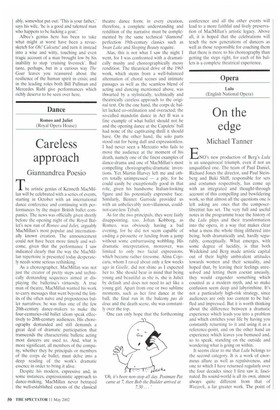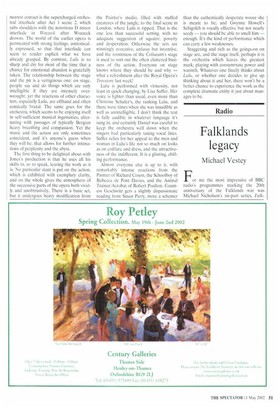Lulu (English National Opera)
On the
edge
Michael Tanner
ENO's new production of Berg's Lulu is an unequivocal triumph, even if not an unqualified one. The team of Paul Daniel, Richard Jones the director, and Paul Steinberg and Buki Shift', responsible for sets and costumes respectively, has come up with an integrated and thought-through account of this compelling and bewildering work, so that almost all the questions one is left asking are ones that the composerlibrettist has set. The very full and useful notes in the programme trace the history of the Lulu plays and their transformation into the opera, in a way that makes clear what a mess the whole thing slithered into being, both dramatically and, hardly separably, conceptually. What emerges, with some degree of lucidity, is that both Wedekind and Berg made artistic capital out of their highly ambivalent attitudes towards women and their sexuality, and hoped that, by leaving their feelings unresolved and letting them coexist uneasily, they would engender something which counted as a modern myth, and so make confusion seem deep and labyrinthine. It's not a particularly high-risk strategy, since audiences are only too content to be baffled and impressed. But it is worth thinking about the difference between a dramatic experience which leads you into a problem and which enriches your life by having you constantly returning to it and using it as a reference-point, and on the other hand an experience which leaves you bemused and, so to speak, standing on the outside and wondering what is going on within.
It seems clear to me that Lulu belongs to the second category. It is a work of enormous allure as well as repulsiveness, and one to which I have returned regularly over the four decades since I first saw it, fascinated. Its sound-world is all its own, almost always quite different from that of Wozzeck, a far greater work. The point of
nearest contact is the supercharged orchestral interlude after Act 1 scene 2, which rubs shoulders with the notorious D minor interlude in Wozzeck after Wozzeck drowns. The world of the earlier opera is permeated with strong feelings, unironically expressed, so that that interlude can seem to render explicit what we have already grasped. By contrast, Lulu is so sharp and dry for most of the time that a chance for emotional abandon is gratefully taken. The relationship between the stage and the pit is a vertiginous one: on stage, people say and do things which are only intelligible if they are intensely overwrought, yet the reactions of other characters, especially Lulu, are offhand and often comically brutal. The same goes for the orchestra, which seems to be enjoying itself in self-sufficient musical ingenuities, alternating with passages of typically Bergian heavy breathing and compassion. Yet the music and the action are only sometimes coincident, and it's anyone's guess when they will be; that allows for further intimations of perplexity and the abyss.
The first thing to be delighted about with Jones's production is that he uses all his skills in, so to speak, leaving the work as it is. No particular slant is put on the action, which is exhibited with exemplary clarity, and on the whole gives the atmosphere of the successive parts of the opera both vividly and unobtrusively. There is a basic set, but it undergoes heavy modification from the Painter's studio, filled with stuffed creatures of the jungle, to the final scene in London, where Lulu is ripped. That is the one less than successful setting, with no adequate suggestion of squalor, poverty and desperation. Otherwise the sets are winningly evocative, unfussy but inventive, and the roominess of the Coliseum's stage is used to sort out the often cluttered business of the action. Everyone on stage knows where they should he and why — what a refreshment after the Royal Opera's Trovatore last week!
Lulu is performed with virtuosity, not least in quick changing. by Lisa Saffer. Her voice is lighter than usual, even more than Christine Schafer's, the ranking Lulu, and there were times when she was inaudible as well as unintelligible. I don't think the text is fully audible in whatever language it's sung in, and certainly Daniel was careful to keep the orchestra well down when the singers had particularly taxing vocal lines. Sailer relies for her appeal to the men and woman in Lulu's life not so much on looks as on coiffure and dress, and the attractiveness of the indifferent. It is a glinting, chilling performance.
Almost everyone else is up to it, with remarkably intense reactions from the Painter of Richard Coxon, the Schoolboy of Rebecca de Pont Davies, and the Animal Trainer/Acrobat of Robert Poulton. Countess Geschwitz gets a slightly dispassionate reading, from Susan Parry, more a schemer than the authentically desperate wooer she is meant to be; and Gwynne Howell's Schigolch is vocally effective but not nearly seedy you should be able to smell him — enough. It's the kind of performance which can carry a few weaknesses.
Staggering and rich as the goings-on on stage are, and the stage itself, perhaps it is the orchestra which leaves the greatest mark, playing with consummate power and warmth. Whatever one finally thinks about Lulu, or whether one decides to give up thinking about it and her, there won't be a better chance to experience the work as the complete dramatic entity it just about manages to be.







































































 Previous page
Previous page